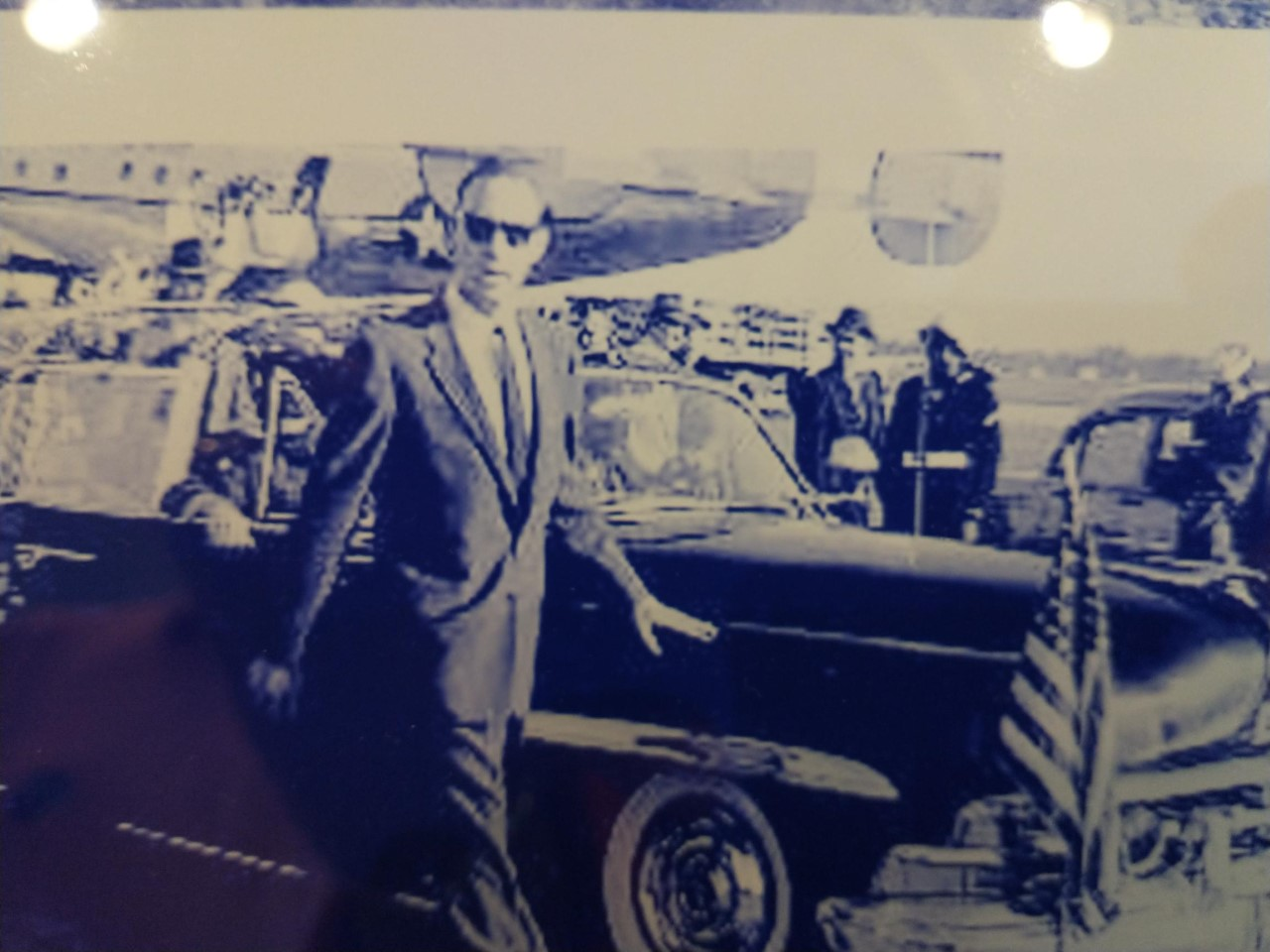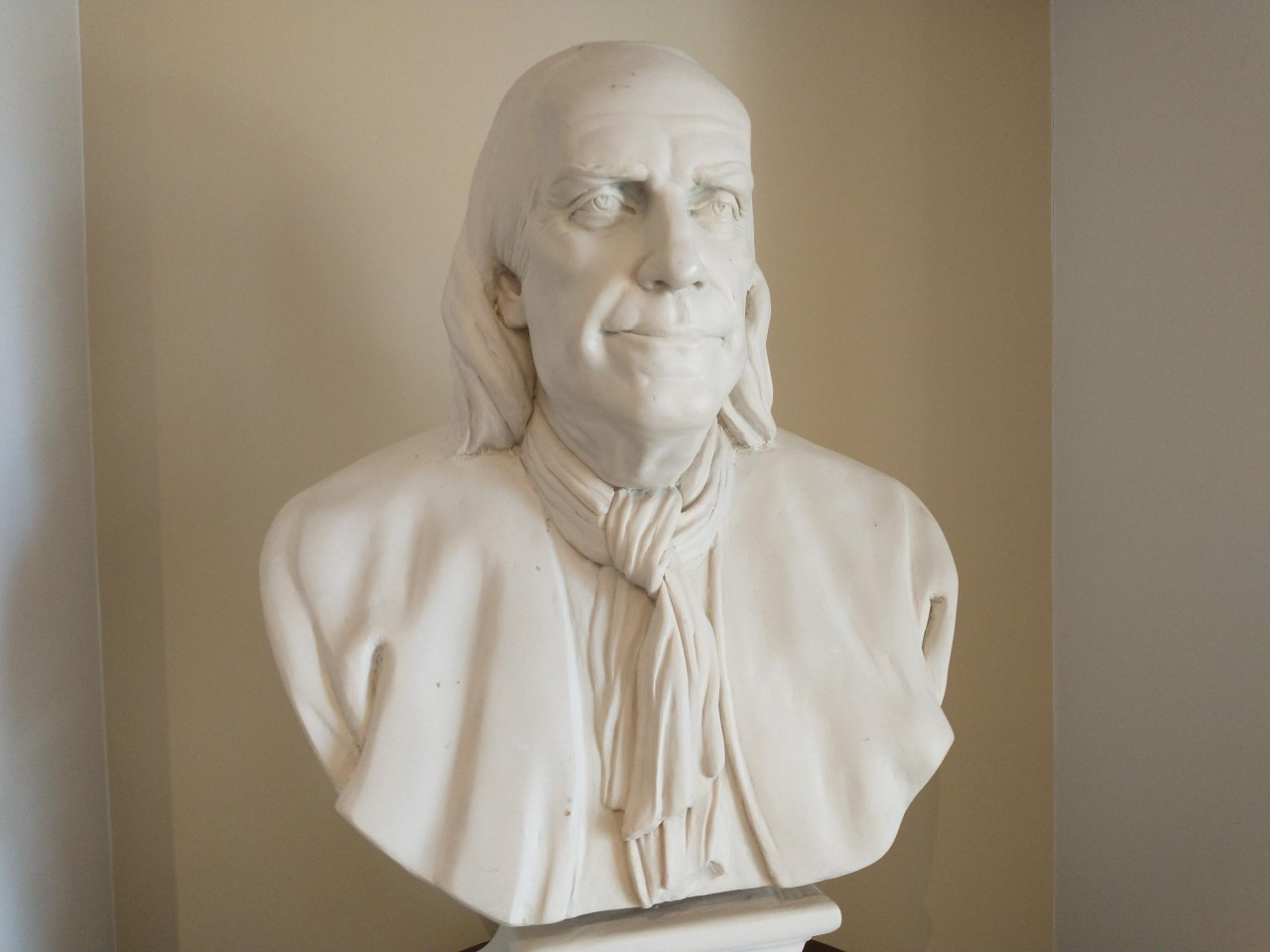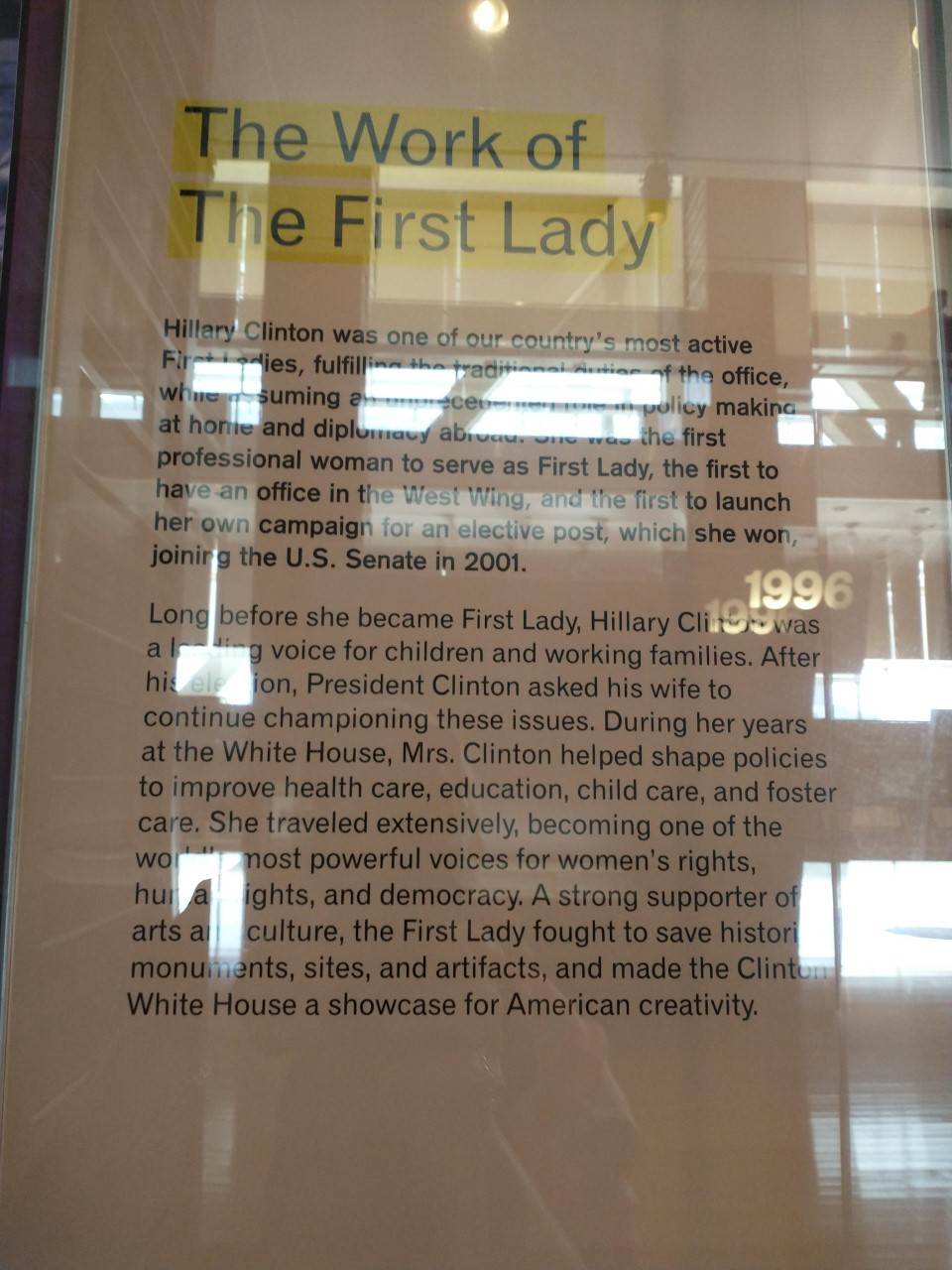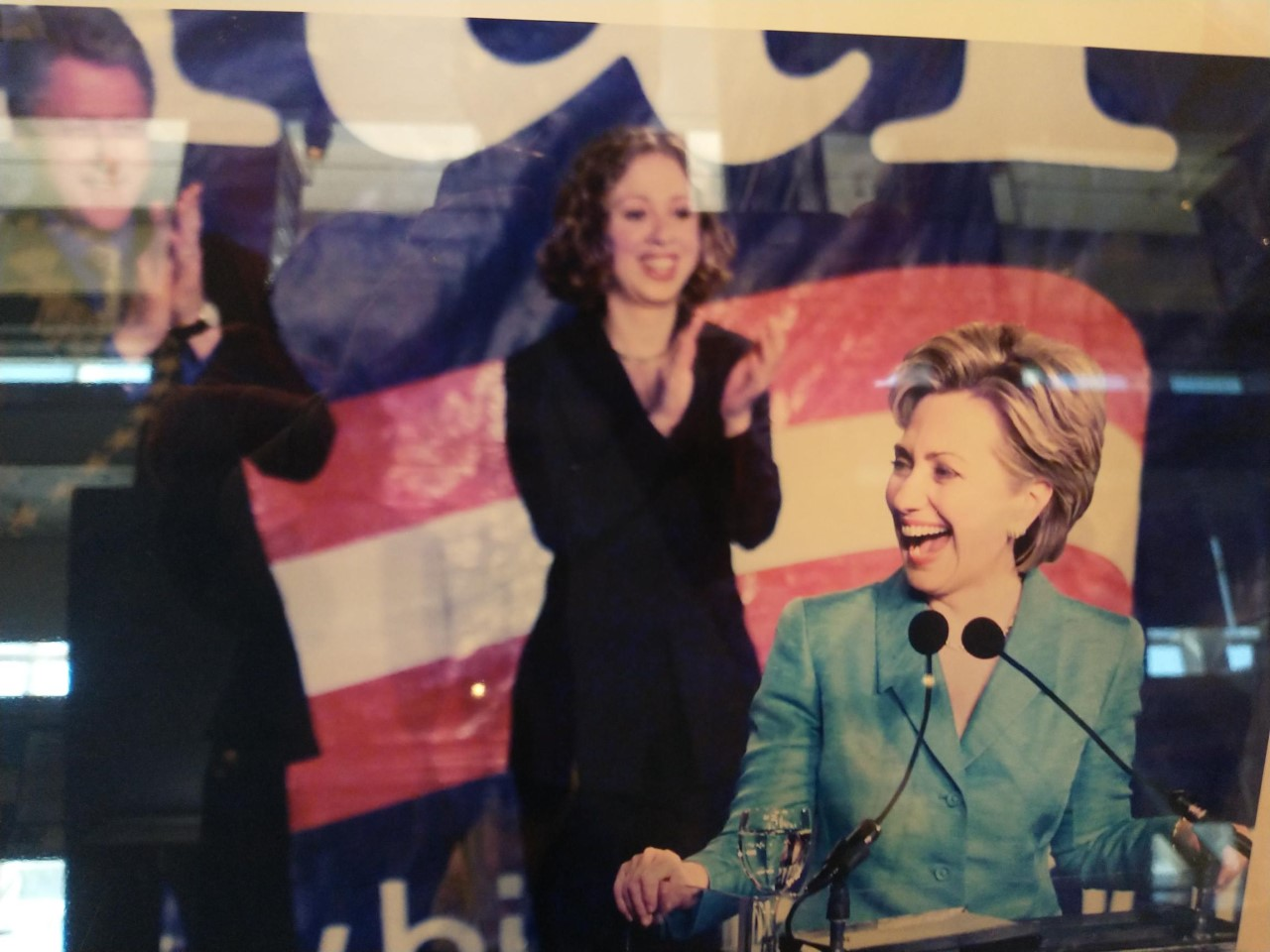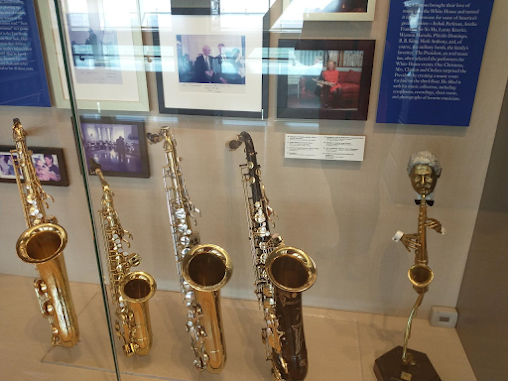Little Rock, Arkansas April 26, 2022
Bill Clinton Presidential Library
Looking to the left, the building simulated a bridge, a Clinton theme of building bridges into the 21st century.
President Clinton stated in his farewell speech at the Democratic Convention. "My fellow Americans, tonight we can say with gratitude and humility: we built our bridge to the 21st century. We crossed that bridge together. And we're not going back. To those who say the progress of these eight years was just some sort of accident, that we just kind of coasted along, let me be clear: America's success was not a matter of chance. It was a matter of choice."

When the United States entered World War II, the only armored vehicle available to the President was the armored vehicle that was seized by the federal government that had belonged to gangster,
Al Capone.
President Roosevelt toured Camp Robinson, Arkansas in 1943 in an that car.
I can truly understand the need for the Secret Service when the president and presidential candidates are in public.
Bill Clinton served as the 42nd president of the United States between 1993-2001.
Nearly a million people turned out for President Bill Clinton's Inaugural Day. Setting up protection for this kind of event has to be a massive job!
"Given a fair chance, I know American workers can compete and win in our own hemisphere and throughout the world. Those who believe otherwise underestimate the American people."Bill Clinton, 1993
Larry enjoyed visiting the Clinton Cabinet Room and sitting in the president's seat.
Benjamin Franklin
Americans were weary of recession but excited about the election of Bill Clinton.
Clinton declared, "There is nothing wrong with America that can't be cured by what is right with America."
The Clinton Campaign focused on economic proposals. His focus passed both houses of Congress without a single Republican vote and went on to create the longest economic expansion in American history.
He also played an active role in brokering a new opening toward peace in the Middle East. Two key campaign promises were kept....the national service program, AmeriCorps; and the Family and Medical Leave Act....became law.

In 1978, Congress passed the Independent Counsel Statute in response to the investigation of the Watergate break-in during the Nixon administration. The new law created a mechanism for investigations of the executive branch by an outside or independent prosecutor.

After the 1994 elections, newly elected Republican lawmakers, under the leadership of Newt Gingrich, brought an ideological agenda and an intense brand of partisanship to Capitol Hill, rejecting compromise and attacking the character of their opponents.
This led to the "battle of the budget". Congressional leadership demanded tax cuts for upper-income Americans and massive cuts in funding for health care, education, and the environment. Clinton vetoed this plan and the GOP forced two government shutdowns.
Strong public support for balancing the budget and investing in our future brought Congress back to the bargaining table, leading to the restoration of many of the proposed cuts and paving the way to a balanced budget.
In 1994 Clinton said, "It is time to end welfare as we know it and replace it with a system that is based on work and responsibility---a system that will help people help themselves."
During the Clinton's second year of administration, he strived for growth of the global economy, the spread of new democracies, to end the tragedy of wars driven by age old hatreds, and encourage the rapid growth of communication through use of the Internet.
Israel and Jordan signed a historic peace agreement. King Hussein of Jordan and the Israeli prime minister, Yitzhak Rabin signed a declaration of peace while at the White House that ended a war between their countries that had lasted for 46 years.
Over the next 20 years, however, even many advocates of the law came to see it as deeply flawed. Prosecutors had virtually unlimited discretion to investigate whatever they wanted.
Inquiries stretched on for years-costing millions, destroying reputations and achieving little good. The law became a potent political tool.
By 1998, seven separate investigations of the Clinton administration were under way by Special Counsels. They cost well over $100 million in taxpayers dollars. The Kenneth Starr investigation alone spent $70 million. None of these efforts yielded a conviction for public misconduct. In 1999, both parties in Congress allowed the Independent Counsel Statute to expire.
After the 1994 elections, newly elected Republican lawmakers, under the leadership of Newt Gingrich, brought an ideological agenda and an intense brand of partisanship to Capitol Hill, rejecting compromise and attacking the character of their opponents.
Dedication of the Franklin D. Roosevelt Memorial in 1997.

For the first time since 1969, the Clinton administration recorded a budget surplus of $70 billion four years ahead of schedule.
President Clinton stated in his farewell speech at the Democratic Convention. "My fellow Americans, tonight we can say with gratitude and humility: we built our bridge to the 21st century. We crossed that bridge together. And we're not going back. To those who say the progress of these eight years was just some sort of accident, that we just kind of coasted along, let me be clear: America's success was not a matter of chance. It was a matter of choice."

The Clinton Library was quite informative showcasing his 8 years as president.
Dedication of the Franklin D. Roosevelt Memorial in 1997.

Second Inaugural
The administration led international efforts to secure universal adherence to and compliance with the Chemical Weapons Convention, and international treaty making the production, acquisition, stockpiling, transfer, and use of chemical weapons illegal.
On January 7, 1999, the Senate began its trial, hearing arguments from Republican members of the House Judiciary Committee, known as "impeachment managers," then from the President's lawyers, including a powerful closing statement by former Arkansas senator Dale Bumpers. On February 12, ten Republicans joined all 45 Democrats in rejecting the perjury charge: five Republicans joined the Democrats in defeating the obstruction of justice charge. The President had been acquitted on both counts.
For the first time since 1969, the Clinton administration recorded a budget surplus of $70 billion four years ahead of schedule.
President Clinton became known as the "Most Traveled President".
Over his eight years as president he visited 74 countries on six continents.
In 2000 Hillary Clinton became the first wife of a president to run for elective office. Securing 54% of the vote, Vice President Al Gore swore in Hillary Clinton as the new US Senator from New York on January 3, 2001 three weeks before the Clintons left the White House.
In 1995, Hillary Clinton wrote a best selling book,
It Takes a Village. During the 1990's, the majority of mothers worked outside of the home and increasingly parents were struggling to balance work and family.
The First Lady spotlighted the importance of early child development; fought to make child care affordable and health care available for more children; and spearheaded a historic effort to provide quality, affordable health insurance for all Americans.

The Oval Office
This is a full-scale replica that is identical in every detail to the Oval Office during President's years in the White House.
The Oval Office the centerpiece of the American Presidency. The Oval Office was created in 1909 when President William Howard Taft expanded the West Wing. In 1934 President Franklin D. Roosevelt had the room moved to the current location in the southwest corner of the West Wing. Since then every President has regarded the Oval Office as both a ceremonial room and a working office.
The Oval Office is used as a place to complete the Daily business of the nation, sign legislation, meet foreign heads of state, and deliver important addresses to the American people.
The Clintons brought their love for music with them to the White House. They showcased many great artists: Aretha Franklin, Lenny Kravitz, Wynton Marsalis, B. B. King, Mark Anthony, Placido Domingo, and the family favorite, the military bands.
Sports was a big part of the Clinton years. I personally remember him causing all kinds of hoopla by jogging around the streets of Washington, DC. The family loved basketball, ping pong, and golf. Clinton played courses all over the world with Tiger Woods, Jack Nicklaus, and other legends. The Chicago Bulls, the Arkansas Razorbacks, and the Women's World Cup team visited the White House.
For the 1997 inaugural festivities, Mrs. Clinton wore this simple, but elegant gown. she asked her friend, the designer , Oscar de la Renta to create this dress of gold-embroidered tulle with matching satin cape. This dress was to be worn at the last presidential inauguration of the 20th century.
That evening the First Couple attended the Presidential Gala and 14 Inaugural Balls which were attended by well wishers from all over the world and all walks of life.
An invitation to a White house State Dinner is one of the most coveted affairs in America. Clinton State Dinners ranged in size from 130 to 400 guests. These special evenings were designed to pay tribute to overseas guests, while showcasing the best of our country's cuisine and culture.
After-dinner entertainment was always a highlight of the festivities. The evening often ended with a special tour guide-President Clinton himself-bringing his guests through the White House and describing its history.
Nelson Mandela
She had a charmed life going from the Arkansas Governotors Mansion to the White House
at the age of 12.
A view of the Clinton gardens from the 2nd floor of the Presidential Library.
The restaurant, "42", was in the first floor of the presidential library. The name came from Clinton being the 42nd president of the United States.
This converted train bridge was converted to a walking path that crosses the Arkansas River. The bridge is just outside of the Clinton Presidential Library.
The Clinton School of Public Service
The Clinton Library was quite informative showcasing his 8 years as president.
After visiting the Clinton Library, Larry and I drove to Nashville and spent two nights. We enjoyed walking Broadway Street of downtown Nashville...Honkytonk Highway.
Next we drove to Knoxville and boarded a plane to fly into Clearwater Beach for a two week stay. We
flew back to Knoxville, picked up the van and the RV and drove to the Hills of Home Bluegrass Festival in McClure, VA. After long weekend of music, we drove back to our home in Warrenton to get ready to meet some of our closest friends for the Graves Mountain Music Festival that following weekend.
Life is sooooo GOOD!



